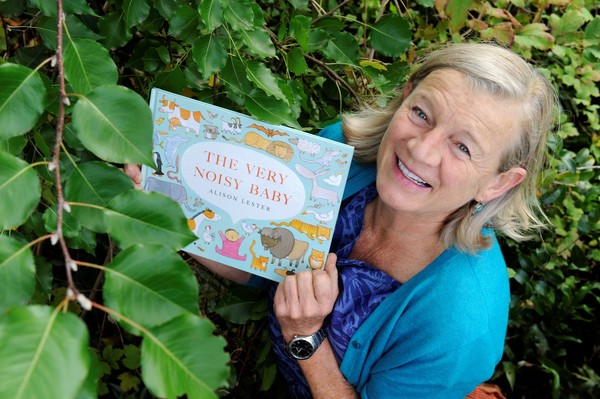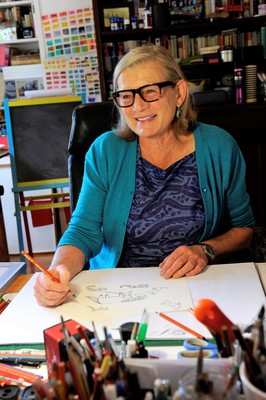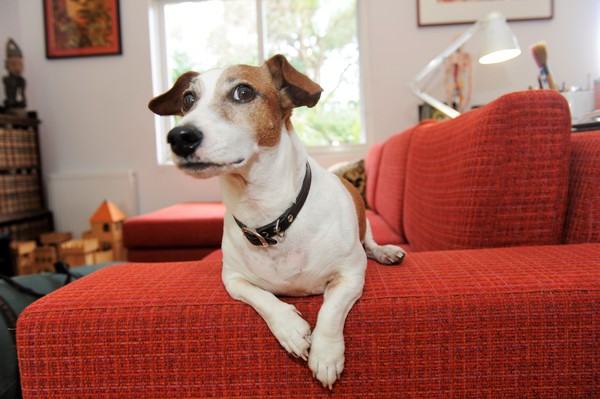
Alison Lester is one of Australia’s best-known children’s authors and illustrators, with more than 25 children’s picture books and two young adult novels. Her picture books are often influenced by her childhood on a farm in Gippsland’s Yanakie, near Wilsons Promontory, including enduring favourites My Farm, Noni the Pony, and Magic Beach.Alison’s career has taken her around the world, from remote Australia to Antarctica.
Jade Glen caught up with the long-term Nar Nar Goon resident to chat about her career, becoming a grandparent, and the importance of reading to children.
You’ve done lots of artist-in-residence and writers-in-residence in some amazing places. Do you say yes to everything?
Well I try not to because we’ve got heaps of grandkids now. I think ‘oh yes that sounds great’ – and then when I have to do it I think ‘oh I don’t really want to go’, because I would rather be home with the babies. It’s nice to get out to the places but it also means you are away from home.
And how many grandchildren do you have now?
There’s six, and another one coming soon. The oldest one has just turned four.
And what are your children up to now?
Will, the oldest one is the district veterinary officer at Leongatha and he’s got three little kids with another one on the way. Clair, my daughter, has got two babies and one of them’s really new, and she’s a children’s book publisher with a company called Affirm Press in the city. Lachie, the youngest one, is a grain trader. He’s got a little girl called Francesca and she was born prematurely last year. She was in the Royal Children’s Hospital for three months, but she’s going really well.
How premature was Francesca?
She was about 10 weeks premature. For that three months, she had her own nurse for the entire time. It’s amazing the care we can get.
The Silver Sea – this is what you wrote in collaboration with the children at the Royal Children’s Hospital?
Well that’s what we planned originally. While I was a children’s laureate I started going to the hospital and then after a while Jane Godwin, who used to be my editor at Penguin and is also an author, was interested in coming too. So we’ve been going together, and it’s nicer doing it as a double gig. For a while the teachers there were really keen for the kids to write a story. But because we weren’t there all the time, and the kids were coming and going, we decided we would write the story and get the kids to illustrate it. Years ago, I went to Antarctica and did a project called Kids Antarctic Art and we sell those images all the time and use them in books as well. And because they are not really mine, I did them with children, the profits from them I’ve always said would go to the Royal Children’s Hospital. But it’s always been complicated to donate to the hospital and get it through to the school, so we’ve gotten around that by me just buying art supplies and giving them to the school.
How long were you in Antarctica for?
The first time I was there for six weeks on the Aurora Australis, a lovely ship.
Was Antarctica what you expected?
I guess it was – I just love it, I’ve been back five times now. It’s so incredible, it’s like going to a different planet really.
And how did you become involved with the Indigenous Literacy Foundation?
I’d been doing work in remote communities for a long time, and when I heard about it I thought ‘oh wow, that sounds like a really good fit for me’. So eventually we met up and I’ve been doing work for them ever since, usually going to communities and helping them make books. I’ve just been to Amata helping make books with the playgroup there.
Your books have a strong connection to Yanakie, where you grew up, and nearby Fish Creek. Do you go back there a lot?
Yes, that’s where I grew up and I’ve inherited a little bit of the farm, so we’ve got a house there that we go to. We’ve got the shop at Fish Creek and a brother and sister and some friends down there, so I drive down there all the time, it doesn’t feel like any distance at all.
It sounds like an amazing kind of childhood to have, growing up on a farm and doing all of those things that are in your books.
Yes. And I guess a lot of people around here would relate to it, growing up on the land.
Do you think that’s important for kids, to be mucking around outside with animals and having those adventures?
I think it’s really important. When I flew back in to Melbourne recently I came in from the north and there were just acres of houses – these huge houses with a backyard as big as this kitchen table. And you think what are those kids doing? They must be inside all the time. I just know with my kids and grandkids, they always get so ratty if they are inside too much. Being outside and being in the world is just a tonic, you know, and for us too. If you are in a bad mood there is nothing better than going for a run or a walk and just seeing what’s around you.
When I was young one of my favourite books was The Quicksand Pony. Was that based on a story that happened to you, or to someone you knew?
When I was a little girl, my dad and my uncle used to lease the southern part of Wilsons Promontory and run cattle there. We had this beautiful horse called Taffy, a big Buckskin horse and he got bogged in quicksand on the way home. So it was a combination of that story, and also the story of Biddy, who was, depending on who tells the story, either an Aboriginal woman or a convict who escaped from jail in Tasmania, and she came across Bass Strait in a rowboat with other people, which was wrecked on the coast of the prom and she was the only survivor. And she lived for a long time out there by herself until she was found. I don’t know if she needed rescuing, but she was ‘rescued’. So it was really a combination of those two stories, and as a kid I loved that thought of living in the bush by yourself.
So how did you get from the family farm to Melbourne?
I boarded at St Margaret’s (in Berwick) for four years, and then I went to Melbourne Uni and did a year of Arts and just mucked around the whole time. I went to the pub and was a ratbag really. And after that my parents kind of pulled the pin and said ‘you’ve got to do something’. So I trained as a secondary art teacher. That was a lot about art but not a lot about teaching, so when I actually went teaching I didn’t like it very much. Eddie and I got married and went to South America and travelled around there for a year, and when we got back we started our family, and that’s when we came here.
About the same time I thought ‘I don’t want to be home with nothing to do’, so I thought maybe I could get some work as an illustrator – I rang a publishing house and asked for some work and was really lucky to get the right person on the end of that phone who said ‘come in and meet me’. She gave me my very first break and we are still really good friends. I probably illustrated other people’s work for about five years and then started on my own stories.
Did you consider yourself more of an artist, or more of a writer?
A bit of both I think. It’s funny, when I’m writing I think it would be easier to be drawing, and when I’m drawing I think it would easier to be writing. I find writing, the actual physical act of writing, very boring – that you just have to sit there and do it. Because I do picture books mine are quite short, so I do a lot of it in my head. While I’m driving I will often just say stuff aloud as I go, just trying to get the words right. I’ve done a couple of novels for kids but I can’t imagine having the time now to just sit down and write a novel. Maybe when the grandkids are older and I can’t walk or something like that, I’ll sit down and do some more writing.
Does it take quite a while to do a picture book – what’s the process?
I’m getting much faster now, because I just don’t have much time. I think the longest was 10 years for Are We There Yet. I did other things in the meantime, but it was a really long process. I probably aim to do one book a year.
And when you were young, did your parents read to you on a regular basis?
Yes we were always read to. We didn’t have nearly as many books – I don’t think there were as many books around. I can really only remember having a few picture books but once we could actually read, we had masses of books. I could remember struggling to read John and Betty in Grade 2. Kids read a lot earlier than that now – a lot of kids can read by the time they go to school – so it’s really changed. But there are heaps of kids too that don’t ever learn to read properly, that’s the big thing.
So did you read to your own children every day?
Well, I would like to say I did. We read a lot, but Lachie, the littlest one, often missed out because we were so busy. He would be down in bed calling ‘mum, come read to me!’ And I’d yell out ‘I’m coming!’ And then I’d get down there and he’d be asleep, or I would read to him and I would fall asleep. He’s turned out to be a bookworm so that’s OK.
Do you think the message is getting through, with libraries and the Premiers’ Reading Challenge and things like that – do you think parents are aware of the importance of reading to their children?
I get the feeling that we are always preaching to the converted, we are always getting to the people who read books anyway. And there are lots of families who really have been generationally disadvantaged, who don’t have books in their houses, who you don’t get to. And I think there needs to be massive government help. Have you heard about Doveton College? It’s a school but it’s also a go-to place for adults that need to learn things, and it’s a health centre – it’s a real social hub. For so many people, just taking their kids to school is so intimidating. So we should have a lot more places like that, so it’s easier for people to get their kids to school, even to pre-school early so they can learn how to hold a book and learn how to hold a pencil.
And you share books with your grandchildren obviously – do they enjoy your books?
Yes, they are just in amongst the other books. The very Noisy Baby is based on my granddaughter Trixie, and she’s very aware that it is her book.
Oh, so now are you going to have to do books for all of them?
Yeah, I’ve done Bigsy so the dog got in before some of the kids!
Do you find being a grandparent different to being a parent?
Yeah, I think I’m a much better grandparent then I was a parent. You have time. When you are a parent you’ve always got so much to do. But when you are a grandparent you can go well actually there’s nothing I have to do today, I can just sit here on the floor and hang out with these kids. But I miss them so much if I don’t see them for a few days. You know you start getting older and life’s a bit hmm, you know, nothing’s happening – and then you have grandkids and life’s fantastic.
So what projects are your working on at the moment?
I’m on a really tight deadline to get Noni the Pony rescues a Joey finished, which is the third Noni the Pony book, and then straight after that I’ve got to get another book for Affirm press called Tricky’s Bad Day, which is about a small person having a bad day.
Yep, happens to all of us doesn’t it. When you were younger, did you ever imagine you would be a highly successful and acclaimed children’s author?
Ha ha – what did I think I would be? I probably thought I’d be living in the country. I always thought I would live in a old weatherboard house with a verandah all the way around, and I’d have lots of kids, and doing something arty. But I didn’t imagine that I would have this career that has been so much fun. I guess it’s taken me places – I’ve travelled the world doing interesting projects and it’s a lovely way to travel. You are not just going to tourist places, like you are actually going to China and going to a kindergarten out in the back blocks and helping teachers there.









